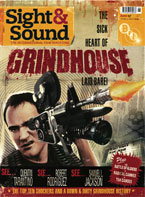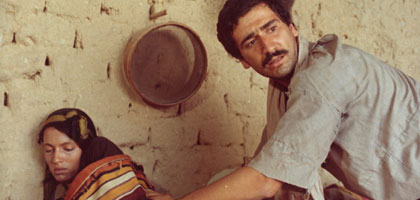
Radical Chic

As the Cannes film festival readies its 60th edition, few will ponder its hidden tradition as a lightning rod for radicalism. But Cannes has always been a political affair. By Chris Darke
The Festival International du Film de Cannes has weathered a fair few storms over its 60-year history, frequently serving as a lightning rod for expressions of political and aesthetic radicalism. It's hardly surprising, given the platform such a prestigious and well-reported event can offer agitators and provocateurs alike. From Jean-Luc Godard to Michael Moore, Guy Debord to Lars von Trier, the festival has provided the plushest soapbox imaginable. But Cannes was political from the outset, conceived in the pre-war years as a counterweight to the Venice film festival, which under Mussolini was fast becoming a stage for fascistic tub-thumping. Here are four snapshots of some of the flashpoint moments in the festival's history.
1. Sky writing
Thanks to its location on the Côte d'Azur Cannes was able to capitalise on a regional association with the artistic avant-garde that reached back to the 19th century and included such figures as Renoir, Monet, Cocteau and Picasso. Cocteau would serve as something of a figurehead throughout the 1950s and was several times president of the jury. During the same decade Yves Klein, an artist associated with the Ecole de Nice, executed one of his first neo-Dada acts by 'signing' the dazzling blue of the Riviera sky, calling it his "first and biggest monochrome". But the combination of the tuxedoed beau monde and artistic enfants terribles could prove combustible.
At the fourth festival in 1951 the shock troops of the Parisian avant-garde descended uninvited in the shape of the Lettrists. Led by 26-year-old Jean-Isidore Golstein (known as Isidore Isou), they hustled a screening of Isou's four-hour epic of anti-cinema Traité de bave et d'éternité. Less significant than the predictable displays of audience hostility was the effect it had on 19-year-old lycée graduate Guy-Ernest Debord. Debord returned to Cannes the following year as part of a 'Lettrist commando team' and a fracas with the festival organisers led to arrests. Many years later the Situationist leader would muse self-regardingly that "the atmosphere of hate and malediction" that surrounded him was perhaps not because of the Situationists' role in fomenting the 'events' of May 1968, claiming: "I think rather that it is what I did in 1952 that has been disliked for so long."
2. All in the family
François Truffaut memorably summed up the classic career trajectory of the enfant terrible as leading from scandal and controversy to "a house in the country and the Légion d'honneur". He forgot to mention that the route has often passed via the Croisette, whose bourgeoisie has learned to love being shocked by successive generations of cinematic scandalmongers. Truffaut's regular broadsides against the festival as a young critic saw him banned in 1958. He attended nonetheless, declaring in print: "The next festival is condemned!" His first feature Les Quatre Cents Coups went on to win the Best Director prize the following year, neatly demonstrating that one of the ways Cannes handles its critics is to co-opt them into what president Gilles Jacob calls "the Cannes family".
Some scandals really take the pulse of the times. In 1973 awards for Marco Ferreri's gastronomic shocker La Grande Bouffe and Jean Eustache's punishing psychodrama La Maman et la Putain led to outraged speeches in the Assemblée Nationale. But these films were selected as responses to the social upheavals of May '68 and reflected the shift in sexual mores evident elsewhere in the festival in the increased presence of hardcore pornography.
Perhaps the most persistent of present-day provocateurs is Lars von Trier, who from his first invitation in 1984 has routinely rubbished any laurel other than the Palme d'Or. In 1991 he called jury president Roman Polanski "a midget" and he didn't even bother to show up when Breaking the Waves competed in 1996.
3. Champagne and sunbathing
Where the British say 'champagne socialist', the French use the equally derisive gauche caviar - and in 1968 Cannes served up generous helpings of both. That year the festival was caught up in the tumult of demonstrations and strikes that gripped France, and a group of film-makers led by Truffaut, Godard and Louis Malle succeeded in shutting it down in sympathy with the students and workers.
While the wider gains of May '68 have been disputed ever since, Cannes would not be the same afterwards. One of the protestors' demands had been that the festival 'democratise' itself and become more open to world cinema, which led to the creation of the Quinzaine des Réalisateurs (Directors' Fortnight) sidebar where coming talents from around the world could show their films. Quinzaine co-founder Jean-Gabriel Albicocco later claimed that what happened in May '68 "saved the Cannes festival for the next 30 years." In the three years following 1968 it looked as if Cannes had caught the counter-cultural bug in a major way, with prizes awarded to such paeans to libertarianism and revolt as Easy Rider, If...., M*A*S*H and Z. But Gilles Jacob's ironic description of the atmosphere at the 1969 event still holds true: "One rushes to the aid of the oppressed minorities before going sunbathing."
4. Taking on the world
One of the direct results of 1968 was a change in the way films were selected. From 1971 onwards it was no longer competitor countries which nominated titles but the festival itself. This overlapped with the extraordinary vitality of 'third cinema', which responded to post-colonial liberation struggles and life under dictatorial regimes.
In 1969 Glauber Rocha won the Best Director prize for Antonio das Mortes, providing recognition to Brazil's cinema novo. In the same year Andrei Tarkovsky's Andrei Rublev took the International Critics Prize, much to the fury of the Soviet authorities. Cinematic reckoning with France's own protracted and bloody colonial war in Algeria took longer to materialise: in 1975 Algerian director Mohamed Lakhdar Hamina's Chronique des années de braise (Chronicle of the Years of Fire), an account of the Algerian nationalist struggle, took the Palme d'Or in an atmosphere made febrile by death threats and bombings.
The radicalism of the 1960s has since transmogrified into the defence of 'human rights', with directors such as Poland's Andrzej Wajda and Iran's Abbas Kiarostami among the beneficiaries of what has been dubbed the 'unspoken function' of Cannes, the laudable aim of defending film-makers from censorship.
